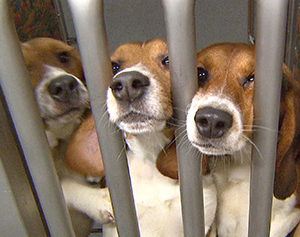Irish Anti-Vivisection Society Response to 2014 animal experimentation statistics for Ireland
Figures recently published by the Government’s Health Products Regulatory Authority (HPRA) reveal that it authorised 226,684 animal experiments in Ireland during 2014.
The Irish Anti-Vivisection Society is pleased to see a decrease of 52,695 (18.9%) experiments on animals in Irish laboratories compared with 2013. However, a staggering 90,072 procedures were classified as causing 'severe' pain and distress to the individual animal. This is completely unacceptable. Animals being used in experiments include specially bred mice and rats, horses, donkeys, dogs, cats, rabbits, guinea pigs, cattle, fish, sheep, pigs, ferrets, frogs and goats: these are all sentient creatures capable of experiencing great fear and stress as well as physical pain and discomfort from the procedures they undergo.
There are worrying upward trends in the categories ‘basic research’ [1] (where the primary goal is to further biological knowledge without any firm identifiable health or medical benefits) and ‘translational & applied’ research [2] (intended to provide data which is claimed to be more directly inform human or veterinary medicine). In particular, basic research into the immune system has taken a far greater toll on animal lives, with 20,044 experiments in 2014 compared with 10,796 in 2013. Meanwhile, ‘translational’ experiments supposed to be towards human musculoskeletal disorders and animal diseases have both risen in the region of 34-44%. On the plus side, fewer animals have been harmed in the course of research into mental and nervous disorders.
While there has been a much-needed reduction in toxicology testing, a far greater commitment and urgency needs to be brought to bear on reducing the numbers of animals used for these painful experiments, and onward to the elimination of all animal testing, which is the stated ultimate goal of the EU.
One of the fundamental obstacles to achieving such progress is the Irish Government’s ‘demand-led’ attitude towards animal testing, as revealed in the concluding statement to the statistics [3]. The IAVS strongly believes that the Government should not abandon hundreds of thousands of animals to their fate at the hands of private interests. In a civilised democracy, preventing cruelty to animals should be a genuine priority of the state. If the Government is serious in its commitment to protecting animals and furthering the ‘Three Rs’ of Replacing, Reducing and Refining animal tests, then it has to get a grip on this policy and develop a clear strategy with targets to eliminate harmful animal use in science.
The IAVS warmly welcomes Science Foundation Ireland’s positive response to our call to set aside dedicated funding to develop research methods to replace the use of animals. This is a first step towards a coherent and ethically-sound policy to protect animal welfare and modernise biomedical research. We will continue to offer constructive proposals to achieve this important goal.
Notes:
[1] 34512 (+3891; +12.7%)
[2] 47658 (+4909; +11.5%)
[3] ‘The level of research undertaken within the state fundamentally influences the data. In the future, if there is an increase or decrease in the number of breeder/supplier/user establishments and studies undertaken, this will impact accordingly on the data acquired by the HPRA.’


